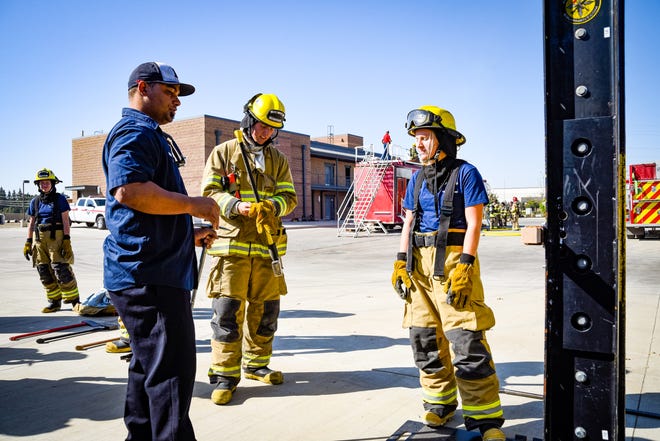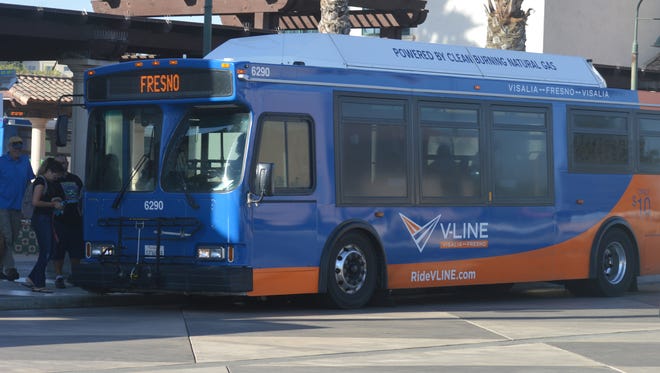
Looking for more information about what happened during this week’s city council meeting?
Here’s a recap of what you may have missed:
Before the scheduled meeting, city council members held a work session surrounding a potential micro-transit pilot partnership between the city and the Tulare County Regional Transit Agency.
If the city opts to partake in the three-year project, it would be at no cost to the city and would provide city staff with various metrics and performance measurements.
Combined, the program would help the city determine whether Visalia should establish its own micro-transit service, if it should continue to partner with Tulare County Regional Transit Agency, or if the service should be cut altogether.
Micro-transit is supposed to be like Uber or Lyft, but made available through public transit. In theory, micro-transit would make transit options more accessible and cheaper all around.
Consent Calendar
Visalia City Council members unanimously voted to accept the agenda’s consent calendar — with the exception of item numbers two and 12 — meaning no discussion on the accepted calendar’s contents occurred.
Councilmember Brett Taylor was not present during this week’s meeting.
The first item pulled from the consent calendar, by Councilman Steve Nelsen, was about a roofing project that recently wrapped up at Fire Station 55 – among the newer stations.
The two roofs at the station experienced “significant damage” over the last 15 years, which led to leaking throughout rainstorms among other problems.
“The roof had a material/manufacturer warranty for 20 years however it was not the roofing material that had failed it was the installation of the roofing that had failed,” a portion of the agenda packet reads. “This caused minimal damage to the interior but if allowed to continue could have caused significant damage to the buildings.”

The city awarded a contract to Brazos Urethane Inc on Oct. 17 for the installation of a new polyurethane roofing system at the station. The new roofs, which did not require the removal of the old roof, withstood the heavy rains in February and March.
The cost for the project was just shy of $200,000 and came out of the Measure N Building Maintenance Fund 142. The new roofing has a 20-year material and labor warranty as well as a 2-year contractor warranty.
The second item pulled from the agenda, pulled by Mayor Brian Poochigian, was surrounding the Majestic Project, construction meant to convert the Majestic Motel into permanent supportive rental housing.
The councilman pulled the item so he could vote against the project.
Gwen Schrank, who operates Schrank’s Clubhouse, spoke against the item, asking the city to look at other organizations that the money could go toward.
Council members authorized city staff (3-1) to apply for Homekey Round 3.0 with RH Community Builders for $15 million to assist with the Majestic Project. Homekey is a statewide effort to help communities sustain and rapidly expand housing for people experiencing homelessness.
The project helps local public entities develop a broad range of housing types, including hotels, single-family homes and multifamily apartments, adult residential facilities, and manufactured housing. Homekey also helps entities convert commercial properties and other existing buildings into permanent or interim housing.
The project’s total budget is around $17 million; so far, $4 million in grant funding has been secured, leaving a cap of nearly $14 million.
If the Majestic Project is not awarded the Homekey funding or only receives partial Homekey funding, RH Community Builders will apply for Housing and Homelessness Incentive Program and Homeless Housing, Assistance, and Prevention Program Round 4 funding.
City council members also authorized city staff to file a notice of completion for the battery backup system and traffic signal preemption projects.
Pelagic Engineering oversaw the project, which cost around $205,000. The funds came from a few funding sources, including the Measure R local fund, general fund, gas tax, and fire impact fee.
City council members also authorized City Manager Leslie Caviglia to award a contract with AMCS Group, Inc so the company can complete upgrades and re-installation on the city’s 20 solid waste front-load commercial trucks and provide ongoing service.
The city first contracted with AMCS Group in November 2017; however, work was halted when the pandemic struck. Any remaining project funds were ultimately released back into the fund.
The technology will allow new accounts or services to be added and sent to the driver’s computer, automatically updating the route. It also allows utility staff and supervisors to see what cans and bins have been serviced, as well as the location of the truck in real time.
The cost for the upgrades and service, which will come out of the Solid Waste Enterprise Fund, is capped at around $505,000 for five years. The city approved appropriating nearly $62,000 for the 2022/2023 fiscal year, and around $54,000 for the 2023/2024 fiscal year.

Council members also authorized $35,000 in funding for potential wall repairs at Valley Strong Ball Park. The stadium’s retaining wall, located on the south side of the complex, was noted to have cracks in the concrete panels on top of the concourse.
City staff “does not believe there will be a catastrophic failure” of the wall; however, they recommended the city hire a structural engineer for an assessment of the structural integrity of the area and to determine what steps need to be taken to stabilize or repair the wall.
Plans for the project are expected before June, and construction — if needed — would start in late September and end in early March, before the start of Rawhide’s 2024 season.
Funding for the project will come out of the city’s general fund.
City council members also authorized the submission of an allocation request of around $411,200 to the California Department of Transportation Low Carbon Transit Operations Program funding.
The money allows the city to continue funding its V-LINE operations, a transit service that has been connecting Visalia and Fresno since 2015.
V-LINE began in November 2015 and provides transit service connecting Visalia to Fresno.

The service saw ridership growth until 2020 when the pandemic hit, and schools shut down. Fresno State students account for the majority of riders on the V-LINE, according to data provided by the city.
The shuttle route includes stops at the Visalia Transit Center, the Visalia and Fresno airports, and Fresno State University. The shuttle takes six round trips each day and offers a one-way full fare for $10.
Council members authorized Caviglia to enter into a new agreement with the California Vanpool Authority for a vanpool service as well as pay the last four months of invoices for $45,000.
Visalia Transit first entered a five-year contract with CalVans in 2016; however, since 2021, the contract has been month-to-month. Funding for the new agreement — $300 per month per vanpool, up to a maximum incentive of $300,000 per year — will come out of the Transit Local Transportation Funds.
City council members also approved Caviglia to submit a grant application to Caltrans for the Clean California Local Grant Program for the North Visalia Beautification project.
The project would focus on improvements along Court Street and NE 3rd Avenue from Dinuba Boulevard to Houston Avenue. Although the city is still waiting for public feedback, some of the improvements include landscaped medians and enhanced parkways, street lighting as well as annual clean-up events.
Each grant awarded has a maximum limit of $5,000,000, and projects must be completed by June 30, 2026. The city is requesting $3,000,000 in funds.
Caltrans is expected to announce the award of funds in August or September.
City council members also authorized Caviglia to enter a one-year contract for $104,000 with Central Cal Waterworks to perform as Chief Plant Operator at the City of Visalia Water Reclamation Facility.
The facility’s Grade V Supervisor left in March 2022, and city staff has been trying to fill the vacancy since without success. Without a Grade V Operator, the city would face disciplinary actions and fines from the State Water Board.
Caviglia was also authorized to amend the city’s contract with Denali Water Solutions for the removal and disposal of biosolids produced at the Visalia Water Reclamation Facility, increasing the funds from $220,000 to $280,000 due to estimated expenses.
Biosolids can only be kept onsite for two years, and the current stockpile had to be removed no later than December 31. There is no way to determine the exact tonnage until it is hauled off and weighed. City staff estimated 2,250 tons based on the average over the last three years, at a cost of $72 per ton.
Denali removed over 2,000 tons of material by the end of December but not all of it, hence the need for additional funds. Due to the severe weather at the start of the year, the company was given the OK from the city to continue hauling the remaining material in January, totaling 3,846.94 tons.
City council members also approved a letter of support for the Tulare Irrigation District’s request for community funding for the Seaborn Reservoir Project.
The project includes excavating a 260-acre area and supplying it with divergent surface flows from the Kaweah River.
Regular Items, Public Hearings
The city then held a second public hearing to approve and adopt the 2023 Annual Action Plan, 2022 Action Plan Amendment, and 2021 Action Plan Amendment.
Visalia city council members finished Monday night’s meeting by conducting a second public hearing and adopting the proposed amendment to the U.S. Department of Housing and Urban Development Neighborhood Stabilization Program.
The amendment provides $120,000 for the funding of First Time Homebuyer Loans for five single-family homes constructed by Self-Help Enterprises at NW 5th Avenue and N. Court Street.
The Visalia City Council meets again at 7 p.m. on May 1 in the Visalia City Council Chambers.






